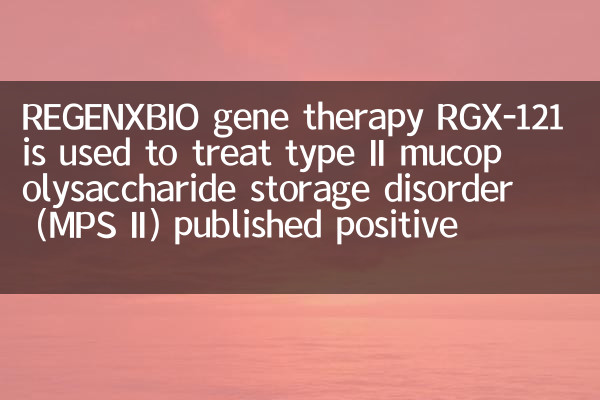REGENXBIO gene therapy RGX-121 is used to treat type II mucopolysaccharide storage disorder (MPS II) published positive clinical data
Recently, biotechnology company REGENXBIO released positive clinical data on its gene therapy RGX-121 for the treatment of type II mucopolysaccharide storage disorder (MPS II, also known as Hunter's syndrome), which has attracted widespread attention from the medical community and patient population. This breakthrough has brought new hope to the field of treatment of rare diseases.
About Type II Mucopolysaccharide Storage Disorder (MPS II)

Type II mucopolysaccharide storage is a rare X-linked recessive genetic disease caused by mutations in the Idururulonate-2-sulfate (IDS) gene, which leads to the accumulation of mucopolysaccharides in lysosomals, which in turn affects multiple organ systems. Patients usually show symptoms such as developmental delay, bone deformity, and nervous system degeneration, and the lifespan of severe cases is significantly shortened. The current standard treatment is enzyme replacement therapy (ERT), but it requires lifelong intravenous infusion and cannot penetrate the blood-brain barrier, which has limited effect on neurological symptoms.
Mechanisms and Advantages of RGX-121 Gene Therapy
RGX-121 is a gene therapy based on AAV9 vector that delivers functional IDS genes to the central nervous system (CNS) through a single intravenous injection, aiming to express IDS enzymes for a long time, thereby improving the pathological progression of MPS II. Its core advantages include:
Latest clinical data highlights
Interim data of Phase I/II clinical trials released by REGENXBIO show:
| Evaluation indicators | result |
|---|---|
| Security | No dose-limiting toxicity or serious adverse events reported |
| Cerebrospinal fluid IDS enzyme activity | 5-15 times the normal range |
| Serum and urine GAG levels | Significantly reduced and maintained at normal levels |
| Neurodevelopmental Assessment | Some patients show a trend of stability or improvement |
Expert interpretation and industry impact
"These data suggest that RGX-121 may change the paradigm of treatment for MPS II. In particular, the persistent high enzyme activity in cerebrospinal fluid indicates a potential protective effect on neurocognitive function that is not possible with existing therapies."
Advances in this therapy have also promoted the development of gene therapy:
| Impact dimension | Specific performance |
|---|---|
| Technological innovation | Verify the feasibility of targeted delivery of AAV9 vectors in the central nervous system |
| Clinical development | Provide a reference pathway for gene therapy for other lysosomal storage diseases |
| Business Value | Probably the first radical therapy to target MPS II CNS manifestations |
Future Outlook
REGENXBIO plans to launch a critical phase II/III clinical trial in the fourth quarter of 2023 and has obtained FDA-granted recognition and fast-track qualifications for rare pediatric diseases. "We will accelerate the development of RGX-121 and strive to bring transformative treatment options to patients with MPS II as soon as possible," said Kenneth Mills, CEO of the company.
With the maturity of gene therapy technology, the success of RGX-121 not only brings hope to patients with MPS II, but also opens up new avenues for the treatment of other rare neurological diseases. Industry observers predict that if subsequent trials go smoothly, the therapy is expected to be approved for marketing in 2025-2026.
As of October 2023, the data in this article has comprehensively compiled REGENXBIO company announcements, medical journal literature and industry analyst reports.

check the details

check the details